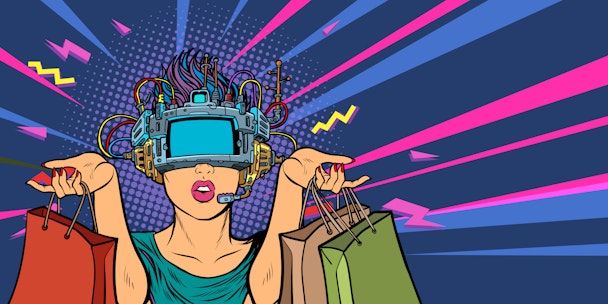The first-ever Metaverse Fashion Week just wrapped. Here’s what we learned
The Decentraland-based event, which hosted activations from a number of high-end fashion brands, could signal a new virtual era for fashion. What else could it mean for the industry’s future?

Virtual fashion could be on the brink of becoming mainstream / Adobe Stock
The first-ever Metaverse Fashion Week (MVFW), which took place March 24-27 on Decentraland, has officially come to a close. In addition to posing a valuable opportunity for brands to engage with younger consumers, the event also marks a departure for the fashion industry away from exclusivity and in the direction of accessibility.
MVFW, while on the one hand was positioned as a kind of simulacrum of its physical counterpart in New York and London, was organized in response to the growing demand for virtual clothing that has lately been surging throughout the fashion world. One illustrative survey recently conducted by Virtue Worldwide found that roughly one in three global respondents had already purchased a piece of digital fashion, and the overwhelming majority (94%) “foresee digital fashion becoming mainstream.”
“Inspired by New York Fashion Week, Metaverse Fashion Week is a first-of-its kind metaverse event showcasing digital wearables,” reads a blurb on the MVFW website. “Directed by tastemakers, powered by metaverse experts, and curated by fashion insiders, Metaverse Fashion Week celebrates digital wearables by connecting top, real-world fashion brands with digital wearables designers to bridge luxury fashion into the metaverse.”
Many high-end brands, ever-attentive to technological trends and consumer demand, have begun to invest heavily in the metaverse. MVFW featured activations from industry giants including Dolce & Gabbana, Estée Lauder, Tommy Hilfiger and Forever 21.
Each of those virtual brand experiences could be accessed by clicking on a link, which included a set of coordinates, on the MVFW homepage. After selecting your destination, you’d be sent off to the surreal world of Decentraland – assuming your computer is able to handle the intense amount of data processing that’s required. Decentraland’s popularity stems largely from the fact that it’s accessible via desktop and thus does not require a virtual reality (VR) headset, but it’s prone to causing computer crashes.
The metaverse represents “the future of broadcasting, the future of advertising and the opportunities for brands to stay relevant,” says Kadine James, a creative technologist at Yahoo who also launched her own non-fungible token (NFT) collection during MVFW. “This future iteration of the internet, these shared 3D virtual spaces, where you can dress up your avatar, go in, [and] experience fashion from some of the biggest fashion brands on the planet ... it’s a really exciting opportunity ... we’re doing things that not so long ago would have been completely unimaginable.”
Though shopping was a major component of the event, it wasn’t the only experience that was on offer. There were also panel discussions, “afterparties,” musical performances, interviews with experts and, of course, runway shows.
To a certain extent, MVFW could be viewed as a legitimate effort to “democratize” fashion, rendering a traditionally expensive and exclusive event (Fashion Week) accessible to the countless people who would otherwise be barred by geographic or economic barriers. But as James points out, those barriers in the IRL fashion world aren’t going anywhere anytime soon. “Is it opening up a front-row seat to a catwalk experience [at] a Dolce & Gabbana show in real life? Hell no,” she says. “Only the elite get to go to those shows.” At the same time, she does feel like the event moves the industry’s needle forward in the direction of both inclusivity and innovation. “Are we offering a web-based experience for people to come in and dress their avatar and experience content from those fashion brands? Yes. And is that progressive? Is that exciting? I think so.”
The metaverse is a very big place. It’s also very young. There’s no single, iron-clad law determining how it will be used, and there are many visions of what it might ultimately become. Some believe that it will turn out to be a short-lived fad, while others – such as Mark Zuckerberg – seem to hold the view that it will ultimately grow to be the primary zone for human interaction. Fashion brands are in the dark here as much as anyone else, but they seem to be operating on the assumption that, at least when it comes to fashion, the popularity of the metaverse will only continue to grow. As demand for virtual fashion continues to expand, so too might the infrastructure and attendance at subsequent Metaverse Fashion Weeks.
For more, sign up for The Drum’s Inside the Metaverse weekly newsletter here.

